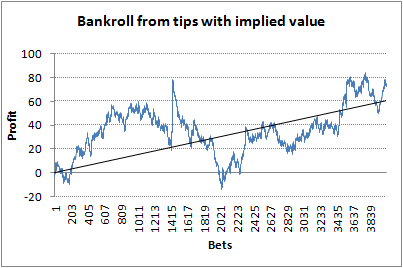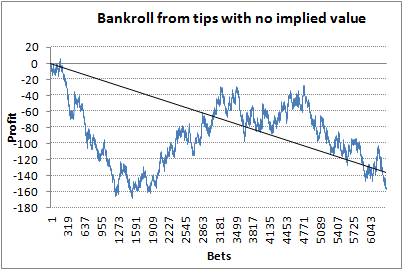How Good are the Tipsters on Oddsportal?
Posted 10th November 2016
In my book Squares & Sharps, Suckers & Sharks: The Science, Psychology and Philosophy of Gambling I reviewed the performance of Oddsportal's Tipping Community. Users of this odds comparison service are free to submit their tips to the community with others free to follow them. Every tip is assigned a price that represents the highest available in the market. Given that many of these prices are published by 'soft' bookmakers who don't like betting winners, followers who bet these tips regularly should expect to see their account restricted. Furthermore, we should expect such brands to frequently offer loss-leading value in a bid to attract new customers. As such, it is probable that a hypothetical betting of all these tips, in the absence of any forecasting skill, should yield a return close to break even, or conceivably even slightly profitable. Indeed, from the sample of 9,759,217 picks which I analysed in the book, the return on investment was 100.30%, which I regarded as evidence of absence of any meaningful collective skill. That is not to say that some tipsters are skilful, they might be. It's just that any that might exist appear to be well hidden. In this article, I've attempted to see if I can find them.
Oddsportal publish a page showing the most popular matches by virtue of tipster interest. Their 'Top Predictions' can be broken down by sport. For this analysis I have focused on football, and specifically the 1X2 (match) betting market. This database includes matches where in the region of at least 20 individual tipsters have expressed a forecast position of some kind or another (on home, draw or away). Many of the most popular matches can see well over 100 tips. For each result outcome, Oddsportal show the percentage of tipsters backing that particular result. The hypothesis being investigated here is whether the favourability of any particular result can indicate an advantage over the published odds. For example, suppose Liverpool were 2.00 to beat Manchester United at home, and 65% of the tipsters backed the home win. This might suggest that odds of 2.00 represented value if we suppose that the percentage of tipsters backing Liverpool was indicative of the true percentage. 65% probability of outcome would then translate into 'fair' odds of 1.54. Of course, we cannot know the kind of betting volumes individual tipsters would personally be staking, nor indeed the betting volumes of their followers.
A sample of 3,461 football matches (meaning a total of 10,383 result outcomes) dating back approximately 6 months was analysed. Betting every selection to level stakes would have lost 0.81%. The sample was divided into two groups: those results where a greater percentage of tipsters backed a particular result than was implied by the Oddsportal odds, and those with a smaller percentage. Betting the 4,038 results from the first group gave a +1.80 yield; betting the 6,345 results from the second group returned a yield of -2.47%. The time series for these two groups are shown below.


It would appear that where a larger number of tipsters back a particular result than should be the case implied by the betting odds, there may be some value to be found. However, it's evidently not large. Furthermore, whilst the time series trends of profit taking in the first group and loss making in the second group are obvious, there is considerable medium term variance of an unexplained nature. The difference in yields between the two groups is not large, and not statistically significant (p-value = 0.10 from a 1-tailed, 2-sample student's t-test).
There is possibly an obvious explanation for the limited available value found in heavily tipped results: by virtue of being tipped heavily, the odds published by Oddsportal have shortened. Indeed, it is the case that the published odds in the 'Top Predictions' archive are closing prices. It is entirely plausible that those heavily tipped predictions would have seen significant price shortenings between market opening and closing. Stoke City U23, for example, was picked by 143 out of 145 community tipsters, to beat Bury last night in the Checkatrade Trophy. Whilst they were wrong, it's worth noting that the opening price of 2.85 fell to 2.15 by market closure (and 3.09 to 1.75 with Pinnacle.com). On the other hand, Vila Nova FC, backed by 72% to beat Brasil de Pelotasin in Brasil's Serie B, closed at 2.36 up from 1.91. However, checking all 10,383 results for opening prices in Oddsportal's database is beyond the range of my data scraping abilities. Furthermore, the timing of when any of these tips were issued between market opening and closing is cpmpletely unknown.
If the backing by large numbers of tipsters of a result still leaves some apparent value in the betting odds, the obvious question is why? Why shouldn't the value disappear completely by closing in accordance with the efficient market hypothesis? Previously I have reported on the analysis of steamers and drifters in the English football league betting market and the apparent residual value left behind in heavily steaming prices, that is to say prices that shorten heavily before closing. To put it simply, big steamers don't seem to steam enough before market closure, leaving the market somewhat inefficienct (although typically not inefficient enough to find profitability with anything other than soft bookmakers). Without further analysis of this Oddsportal data set to see if the apparent value-laden prices had been disproportionately shortening before market closure, all this will remain conjecture. However, it is conceivable that by following large numbers of tipsters who collectively agree on the forecast of an outcome, this may offer an opportunity for some profit taking.
|






